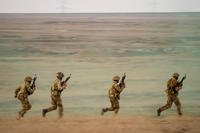Daniel L. Davis is a Senior Fellow for Defense Priorities and a former Lieutenant Colonel in the U.S. Army who retired in 2015 after 21 years, including four combat deployments. Follow him @DanielLDavis1.
The premiers of four German states sent a letter July 19 to members of the U.S. Congress pleading for them to block President Donald Trump's tentative plan to withdraw nearly 10,000 American troops from Germany. The plea was based on their perception of what's good for their country, however, and certainly not based on what's best for America.
The German politicians claimed the removal of any U.S. troops would be alarming, because they form the backbone of "NATO's ability to act." If this were the 1950s or 1960s, such concerns might be entirely valid. At that time, there was a mammoth conventional and nuclear threat from a powerful USSR and its satellite countries of the Warsaw Pact. Germany was still divided and weak both militarily and economically.
The conditions that existed at the height of the Cold War, however, are now to be found only in history books. The situation today is radically different, both in terms of the nature of the threat and the nature of the friendly countries.
In the late 1950s, the USSR and its allies posed a significant threat to Germany and the other 12 members of European NATO boasting ground combat power, naval capacity, air power and a massive nuclear arsenal. Western Europe was still staggering from losses sustained during the Second World War and in no condition to resist the Red Army should the Russians attack.
The USSR imploded in the1990s and no longer exists. NATO has now expanded to 30 countries -- including most of those formerly in the Warsaw Pact--outgunning and outmanning the Russian military in most categories. Both the U.K. and France have nuclear stockpiles of their own, deterring Moscow from ever attempting a western conquest.
Russia President Vladimir Putin may have fantasies of a resurrected Soviet Union, but he's neither stupid nor suicidal: he would never embark on an offensive crusade guaranteed to result in his destruction. Germany is keenly aware of this reality. Whatever Berlin may say, it is their actions in two key areas that confirm they regard the threat from Russia to be relatively low.
First is the area of friction between the German government and U.S. government for decades: the Bundeswehr's unwillingness to spend an adequate amount on its own self-defense or NATO support. In 1973, then-West Germany spent 3.1 percent of its GDP on national defense. In 2019--nearly 30 years since the demise of the Soviet Union--Germany's spending is stalled at a paltry 1.3 percent. If Germany genuinely believed its security was at risk from a resurgent Russia, they would not be spending such an anemic amount.
Secondly, the troubled Nord Stream 2 pipeline deal between Berlin and Moscow exposes that Chancellor Angela Merkel does not consider Putin to be a substantial security risk to Germany. The last thing any country would do if it considered a country to be a risk to its national security would be to make financial and energy deals that would give their adversary an easy opportunity to cut off their energy supplies, essentially holding their economy hostage. Germany clearly believes the chances are slim that Russia would exploit that advantage.
This is not to suggest Germany is wrong in making a pipeline deal with Russia, however. Even after absorbing the former East Germany in 1993, Berlin has built its economy into one of the world's most powerful economies (number 4 in 2019). A strong and independent Germany should be something the United States encourages and affirms. Along with the other strong nations of NATO, Germany should take more responsibility for their own national security and spend whatever percentage of their GDP their people believe is necessary to keep them safe.
The question for American policymakers and lawmakers should not be about what's best for Germany, or even what's best for NATO. It should be about what's best for the United States. Far too often, in far too many locations, the debate has always centered on what's good for the government where our troops are located.
Whether it's Berlin, Warsaw, Baghdad, Kabul, Tokyo, Seoul, or any other location or group, America needs to shift its focus to ensuring we provide the best, most cost-effective security for our country, and encourage other capitals to do the same for their populations.
-- The opinions expressed in this op-ed are those of the author and do not necessarily reflect the views of Military.com. If you would like to submit your own commentary, please send your article to opinions@military.com for consideration.















